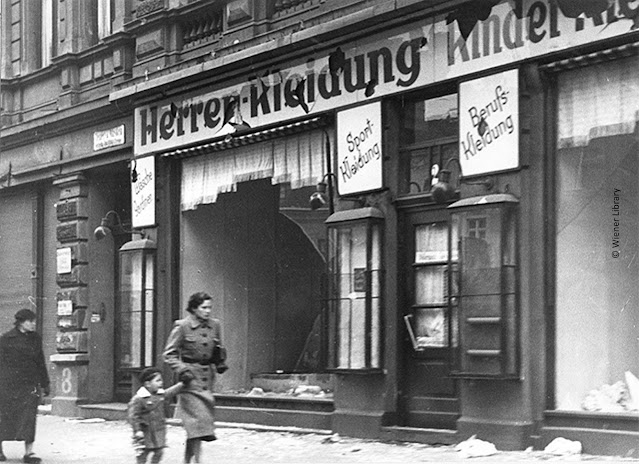2: Kristallnacht
On the night of November 7, 1938, a Jewish refugee in Paris named Herschel Grynzpan, angered by the Nazis' maltreatment of his parents, entered the German embassy and shot Ernst von Rath, a minor German diplomat. Rath died two days later, his demise coinciding with nationwide party celebrations commemorating the Nazis killed during the 1923 Beer Hall Putsch.Orders went out from party headquarters instructing local leaders to mount violent demonstrations against Jews and Jewish businesses. Using the mass-communication facilities at his disposal, Joseph Goebbels exhorted Germans to express their righteous indignation over the murder of Rath by the Jew Grynzpan
Throughout the Reich, mobs of Nazis smashed the windows of synagogues and stores owned by Jews, leaving the streets and sidewalks littered with glass shards that gave the night its poetic name -- Kristallnacht, or Crystal Night. Nearly 100 Jews were killed, and thousands more were beaten up and tormented. The Nazi gangs had desecrated 191 synagogues, set fire to 171 apartment houses, and looted 7,500 stores.
Not to be outdone by Goebbels, Heinrich Himmler and Reinhard Heydrich ordered the SS to arrest 20,000 Jews, preferably wealthy ones. Those Jews arrested on Kristallnacht had a bitter foretaste of things to come. They were herded onto trains bound for Buchenwald, Dachau and other concentration camps. Once in the camps, the prisoners were left for long periods without food or water. Sanitation was nonexistent. Men were ordered to entertain their guards with humiliating acts, and if they refused or performed poorly they were flogged. Many were later released, but only if they swore to keep their mouths shut about what they had seen or experienced in the camp. They had to leave the Reich within a few weeks.
For Germany's Jews, the night of November 9, 1938, was a turning point -- the time when Nazi measures against them escalated from repressive legislation to organized violence. In the aftermath of Kristallnacht, the Nazis promulgated the strictest anti-Jewish policies yet. Jews were to be rooted out of the economy, totally segregated, and forced to emigrate. And Hitler made his strongest public statement to date on the subject of annihilating the Jews. In a speech to the Reichstag, he declared: "During my struggle for power, the Jews laughed at my prophecies that I would someday assume the leadership of the state. I suppose that the laughter of Jewry is now choking in their throats.
"Today I will be a prophet again. If international finance Jewry should succeed once more in plunging the peoples into a world war, then the consequences will not be the Bolshevization of the world and a victory of Jewry, but on the contrary, the destruction of the Jewish race in Europe."
The German press trumpeted the Fuhrer's statements. Many Jews -- and many Germans -- assumed that Hitler used the word "destruction" figuratively. There was no clear sign as yet that he meant what he said literally.
For still another year and a half, the Nazi government made repeated attempts to deport German and foreign Jews. But other countries, underestimating the desperate plight of the Jews, took no emergency measures to relax their stiff immigration quotas. Poland, which had its own anti-Semitism, even closed its doors to Polish Jews who were living in Germany. Nazi officials rounded up 16,000 Jewish Poles and dumped them across the Polish border, but the Poles sent most of them back.
The Germans turned to France as a potential repository for Jews. Foreign Minister Joachim von Ribbentrop tried to persuade the French to accept shipments of German Jews. But French Foreign Minister Georges Bonnet not only refused, he also urged Ribbentrop to prevent German Jews from coming to France on their own. "I replied to Monsieur Bonnet," wrote Ribbentrop, "that we all wanted to get rid of our Jews but the difficulties lay in the fact that no country wished to receive them."
After the German invasion of Poland on September 1, 1939, the cloak of wartime secrecy descended over Nazi brutalities to the Jews. Inside Germany the patriotism engendered by war reinforced the common tendency to obey orders and to look the other way, to avoid inquiries when people suddenly disappeared in the night or died from unexplained causes.




Comments
Post a Comment